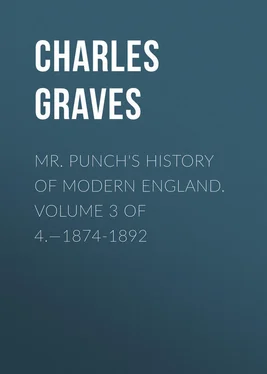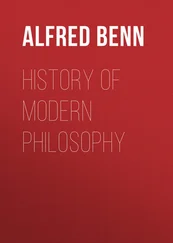Charles Graves - Mr. Punch's History of Modern England. Volume 3 of 4.—1874-1892
Здесь есть возможность читать онлайн «Charles Graves - Mr. Punch's History of Modern England. Volume 3 of 4.—1874-1892» — ознакомительный отрывок электронной книги совершенно бесплатно, а после прочтения отрывка купить полную версию. В некоторых случаях можно слушать аудио, скачать через торрент в формате fb2 и присутствует краткое содержание. ISBN: , Издательство: Иностранный паблик, Жанр: foreign_prose, foreign_humor, на английском языке. Описание произведения, (предисловие) а так же отзывы посетителей доступны на портале библиотеки ЛибКат.
- Название:Mr. Punch's History of Modern England. Volume 3 of 4.—1874-1892
- Автор:
- Издательство:Иностранный паблик
- Жанр:
- Год:неизвестен
- ISBN:http://www.gutenberg.org/ebooks/47300
- Рейтинг книги:3 / 5. Голосов: 1
-
Избранное:Добавить в избранное
- Отзывы:
-
Ваша оценка:
- 60
- 1
- 2
- 3
- 4
- 5
Mr. Punch's History of Modern England. Volume 3 of 4.—1874-1892: краткое содержание, описание и аннотация
Предлагаем к чтению аннотацию, описание, краткое содержание или предисловие (зависит от того, что написал сам автор книги «Mr. Punch's History of Modern England. Volume 3 of 4.—1874-1892»). Если вы не нашли необходимую информацию о книге — напишите в комментариях, мы постараемся отыскать её.
Mr. Punch's History of Modern England. Volume 3 of 4.—1874-1892 — читать онлайн ознакомительный отрывок
Ниже представлен текст книги, разбитый по страницам. Система сохранения места последней прочитанной страницы, позволяет с удобством читать онлайн бесплатно книгу «Mr. Punch's History of Modern England. Volume 3 of 4.—1874-1892», без необходимости каждый раз заново искать на чём Вы остановились. Поставьте закладку, и сможете в любой момент перейти на страницу, на которой закончили чтение.
Интервал:
Закладка:
Much aristocratic distress prevails towards the end of the month, and gangs of hungry Peers infesting the public thoroughfares are prosecuted daily by the Secretary of the Charity Organisation Society, and ultimately shipped to a Coral Island in the Pacific.
Mr. Gladstone's seventy-fifth birthday on December 29, 1884, was welcomed in a set of verses in which the eulogy is only tempered by a faint reserve as to his lack of youthful resolution and his excess of caution. Had the anniversary fallen a few weeks later, Punch might have found it harder to pay such generous homage, for on February 7 appeared the unlucky cartoon which assumed that Gordon had been relieved. Yet even then, when the truth became known and while raising the cry of "Too late," Punch , though condemning delay and caution, deprecated party rancour: —
Not this the hour to echo faction's cry
Of half-exultant chiding, or to ply
The Party-phraser's venomed word-lash. No!
But laggard wills, counsels confused and slow
Should need no sharper spur, no keener goad
Than this to urge them on plain Honour's road.
The Tragedy of Khartoum
Punch's contribution to the Gordon "Memorial" was an ode from which we may quote one stanza: —
Gordon! A name to gild our island story,
Opulent yet in many a noble name,
With lustre brighter than mere statecraft's fame,
More radiant than the warrior's glittering glory.
Such lesser lights eclipse them in the fine
Sun-glow of selfless valour such as thine,
Soldier whose sword, like Galahad's, was not used
To hew out honour, but to champion right;
Plan-shaper who, in council as in fight,
Wast endlessly resourceful, yet refused,
Death-snared, an easy flight!
Other pens were busy over this episode, which inspired perhaps the most scarifying epigram of our times: —
Judas despairing died, his guilt confessed,
But had he lived in this our age and city,
He surely would have figured with the best
Upon a Christ Memorial Committee.
The disaster, however, had one heartening result in the offer of military assistance from Canada, Victoria and New South Wales, duly recorded by Punch in his cartoon of the Lion and the Colonial cubs. The year 1885 had opened with a sinister display of activity by dynamiters, and Punch rebuked Sir William Harcourt for his alleged apathy and imperious resentment of criticism by calling him the "Not-at-Home Secretary." America promptly took legislative action, refusing sanctuary to dynamiters, and was loudly applauded, while Mr. Parnell, in Punch's opinion, missed a golden opportunity for disavowing and condemning these outrages. In "What Mr. Parnell might have said" Punch printed the speech which he did not make but ought to have made, "as a man, an Irishman and a Christian."
Mrs. Gummidge-Gladstone: "I ain't what I could wish myself to be. My troubles has made me contrairy. I feel my troubles, and they make me contrairy. I make the house uncomfortable. I don't wonder at it!!!"
John Peggotty-Bull ( deeply sympathizing aside ): "She's been thinking of the old 'un!" — David Copperfield.
The days of the Gladstone administration were numbered, and the motion in favour of Proportional Representation excited but a languid and academic interest. Punch thought the system far too complicated, and sought to reduce it to absurdity by a practical illustration. He was much more serious in his resentment at the hectoring attitude of Bismarck à propos of a recent speech of the Imperial Chancellor. In "Lecturing a Lecturer – a Friendly Tip to the Teuton Titan," he showed Bismarck standing in a truculent pose before a map of Europe while Punch looks on in amusement. The point of the accompanying verses is that Britain was not to be scared or scolded into submission: —
Orbilian Colossus,
You'd chide us and spank us and goad us and toss us,
But when Polyphemus world-wigging would try
He may – pardon the argot – get "one in the eye."
And Punch , Herr Professor, whose point seldom misses,
Is ready if needful to play the Ulysses.
The attempt to represent Bismarck as a professor might not seem to show a very acute reading of the facts were it not that German professors proved the chief inflamers of militarism. It must be added that, as a set off to this expostulation, Punch indited a remarkably genial poem to Bismarck a couple of weeks later on the occasion of his seventieth birthday. But this can hardly have atoned for the extremely acid and acute satire on the Spirit of German Colonization published about the same time. Here Germania declares her intentions to the native races in language which the treatment of the Herreros in German South-West Africa proved to be well within the mark: —
I haf brought you German culture for the poddy and the mind,
Die erhabene Kultur of efery sort and efery kind;
All the pessimistic dogtrines of the Schopenhauer school
And the blessings of a bureaucratish-military rule.
I shall teach you shplendit knowledge, vot you hitherto haf lacked,
That religion is a fantasy, vhilst sausage is a fact;
Ja, the mysteries of sauerkraut to you shall be made clear,
And your souls shall learn to float on foaming waves of Lager-Bier!
I do not intend to long-while you mit missionary rant,
But to brighten up your intellects mit Hegel and mit Kant.
Mit our Army-Service system I'll begift you by-and-by,
And mit all the priceless blessings of our Hohe Polizei.
Ach! I lofes you as a moder, and your happiness, I shwear,
Shall forefer be the von surpassing object of my care.
I'll civilize you, Kinder, mid dem edlen Gerstenbrei,
And mit discipline, Potztausend! – or I'll know the reason vhy!
And then die hehre Göttin, hof'ring in the aether blue,
Vill summon up her gunboats and her Pickelhauben too,
Her bearded brawny varriors, vot nefer knew no fear,
And troops of learned bureaucrats, all buttoned-up to here.
Then if the shtupit natifes don't attend to vot she said,
And makes themselves unpleasant, they must all be shooted dead;
For trifles in the vay of German culture must not shtand —
Hoch soll der Bismarck leben! I drinks, "Our Fatherland!"
Lord Randolph Churchill
When the Government was defeated in June "on the Budget Stakes," as Punch put it, he went so far as to accuse Gladstone of "riding to lose," and resented this action as not quite on the square. A month earlier he had shown Gladstone as the political Mrs. Gummidge, the "Old 'un" being Disraeli, whose portrait hangs on the wall. There was a rumour of Mr. Gladstone going to the Lords, and Punch had a picture of Tennyson, in his robes in the "gay garden of elegant earls," inviting W. E. G. to "come into the garden," but Mr. Gladstone declines, preferring to paddle his own canoe. Lord Randolph was included in the Salisbury administration, which held office for six months, as Secretary of State for India, but his elevation to Cabinet rank did not appease Punch's distrust – rather the reverse. He was not really an undersized man, but he invariably appears in Punch about this time as a boy, a mannikin or some diminutive pest, while the vehemence of his language is resented in bitter criticism of his "mud-spattering" abuse, vulgar invective, and "Billingsgate Babel." In particular a speech which he delivered at a Conservative gathering at Canford Manor, Wimborne, excited Punch's wrath, and prompted the picture of "Funny Little Randolph," as a "star comique" singing a topical song, "I don't care a rap," and exulting in his grimaces and bad manners. In the previous year Punch had fallen foul of the "windy ravings of Loyalist Speakers" in Ireland, "the Loyalist Cæsar, and the Nationalist Pompey seem 'very much alike' indeed – in the matter of noisy mischief… One feels that the Orange Champions would not hate 'disloyalty' so much did they not hate their 'Green' fellow countrymen more."
Читать дальшеИнтервал:
Закладка:
Похожие книги на «Mr. Punch's History of Modern England. Volume 3 of 4.—1874-1892»
Представляем Вашему вниманию похожие книги на «Mr. Punch's History of Modern England. Volume 3 of 4.—1874-1892» списком для выбора. Мы отобрали схожую по названию и смыслу литературу в надежде предоставить читателям больше вариантов отыскать новые, интересные, ещё непрочитанные произведения.
Обсуждение, отзывы о книге «Mr. Punch's History of Modern England. Volume 3 of 4.—1874-1892» и просто собственные мнения читателей. Оставьте ваши комментарии, напишите, что Вы думаете о произведении, его смысле или главных героях. Укажите что конкретно понравилось, а что нет, и почему Вы так считаете.












